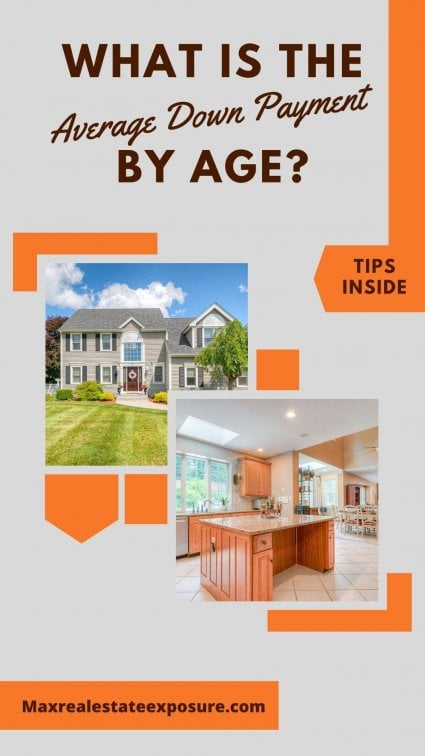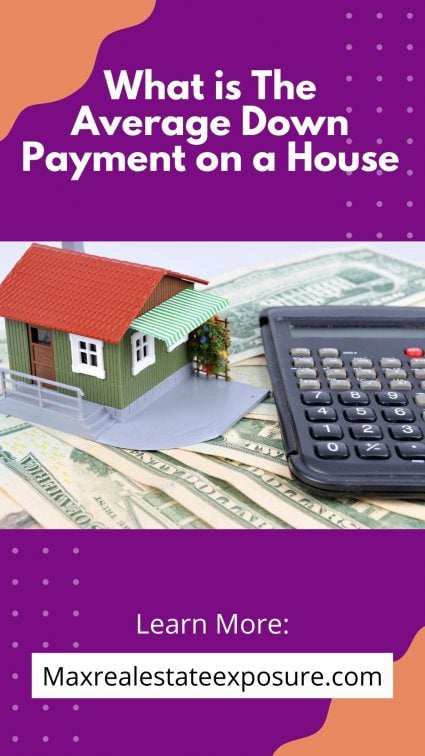 How Much is The Average Down Payment on a House?
How Much is The Average Down Payment on a House?
Are you wondering what the average down payment on a house is? If so, you are not alone. Over my thirty-seven years as a real estate agent, many people have asked what’s normal.
Many things can be mysterious when you have never purchased a home. Unfortunately, there is quite a bit of misinformation out there. One such topic is a house down payment.
Having enough money to make a down payment is essential when buying a house. The down payment will help you purchase and pay for the home over time.
Many folks ask a real estate agent or mortgage lender the average down payment for a house.
Many buyers think they won’t be able to buy a home because they don’t have a large enough down payment. Almost always, they are incorrect.
The average down payment on a house is much more significant than the minimum amount. Buyers often ask how much down payment is needed to buy a home. These are two different things.
Let’s review the typical down payment required for different loan types and what the average buyer pays.
What’s The Average Down Payment on a House For a First-Time Home Buyer?
Many would-be first-time buyers ask what percentage is a down payment on a house. The average first-time home buyer pays around 6% of the purchase price for their down payment, according to info from Attom Data Solutions.
Their study shows a review of the highest down payment amount by metro. What you decide to put down on a home is a personal choice. However, the current real estate market could influence your decision.
When it is a buyer’s market, there will be much more leeway in your decision to put a lower amount of money down. In a hot seller’s market, the down payment percentage could be one factor that influences a seller’s decision to choose one offer over another.
When a low down payment is made by choice, this needs to be communicated to the listing agent. Sometimes assumptions made by real estate agents are false. A typical example is that a buyer with a lower down payment is less qualified to buy a home. At times, this assumption could not be further from the truth.
There are some common considerations when deciding how much down payment should be made. They include:
- The current type of real estate market: buyers vs. sellers.
- How much additional money do you have on hand?
- Do you want your monthly payments to be lower?
- Minimum down payment requirements for the loan type you’re choosing.
- The amount of money needed to fix up the house with improvements
- How close you are to retirement
- Your other existing debts
What is The Average Down Payment For a House Other Than For First-Time Buyers?
For non-first-time home buyers, the average down payment on a house rises to 12-13 percent. Let’s examine a detailed breakdown of a house’s average down payment percentage.
The Average Down Payment Broken Down By Age
 The National Association of Realtors also did a study that broke down the average down payment on a property as follows:
The National Association of Realtors also did a study that broke down the average down payment on a property as follows:
- All buyers: 12% down
- Age 22-30: 6% down
- Age 31-40: 10% down
- Age 41-55: 13% down
- Age 56-65: 18% down
- Age 66-74: 23% down
- Age 95-95: 21% down
According to the National Association of Realtors (NAR), home buyers who saved for their down payments tended to do so for three years.
Many homeownership opportunities are currently out of reach due to the high cost of purchasing a home and the amount of debt from student loans and credit card debt.
A Normal Down Payment Depends on Your Loan Type
The average down payment on a home will change due to the different requirements based on the mortgage program.
Mortgage loan programs have different minimum down payment requirements. These are the major loan types and their respective down payment requirements.
Conventional Loans
A conventional loan is the most popular type of mortgage. A conventional mortgage has a minimum down payment requirement of 3%. However, some mortgage lenders may require a higher percentage down if you have a credit score lower than 620 or carry significant debt.
More borrowers will end up choosing this type of loan than any other.
FHA Loans
An FHA loan is another popular loan type for first-time home buyers. The Federal Housing Administration sponsors it. It is a government-backed loan program with relaxed financial requirements compared to a conventional loan.
You don’t need a good credit score when using FHA financing. FHA loans only require a minimum down payment of 3.5 percent.
You can avoid coming up with a large down payment with this home loan.
FHA loans also have a mortgage insurance premium (MIP) that lasts the entire life. When not buying a turnkey home, you might also look at an FHA 203k loan for your financing.
VA Loans
A VA loan is popular among military veterans. You must serve or have served in the military to use this loan product. The Department of Veteran Affairs sponsors the loan. The most significant benefit of a VA loan is the ability to put no money down. Yes, you read that correctly; it is a no-down-payment mortgage.
VA mortgages do not have insurance premiums, but they have a funding fee that is paid upfront. The funding fee can also be financed into a loan.
USDA Loans
A USDA loan is backed by the federal government as well. The benefit of a USDA loan is you can also put no money down when buying in a qualified rural or suburban area.
The U.S. Department of Agriculture sponsors this loan type. Because VA and USDA loans have no down payment, it brings down the average down payment on a house.
Other Loan Options
Some borrowers may seek a private lender for their home purchase. The downside is that private lenders usually have higher interest rates. You can also look into a first-time home buyers program for various loan types.
The credit score needed to buy a house is much lower than many potential home buyers think.
Needing 20 Percent Down to Buy a Home is a Myth
 For as long as I have been a real estate agent, there has been a myth that you need a twenty percent down payment to purchase a home.
For as long as I have been a real estate agent, there has been a myth that you need a twenty percent down payment to purchase a home.
It probably started because unless you have a 20 percent down payment, you’ll pay private mortgage insurance (PMI). PMI is a few collected by lenders that protect them if a borrower defaults on their loan.
The thinking has always been that if you put less than 20 percent down, there is a higher chance you’ll default on the loan. While paying PMI is mandatory when you have a lower down payment, you can cancel it once you have 20 percent equity.
If you can put down 20 percent, there are benefits to doing so besides avoiding PMI. Lenders also tend to give borrowers lower interest rates.
With a lower interest rate, you’ll pay less for the home over the life of the loan. Remember, banks make money from the interest they charge you.
You’ll be saving thousands of dollars in interest over the life of the mortgage.
When you put over twenty percent down, a lender will often waive the appraisal, saving you additional money.
The downside of putting down more money for some borrowers is not having enough money in reserve if unexpected expenses happen.
When considering how much money you want to put down on your mortgage, it is crucial to consider your loan requirements, financial situation, and individual needs.
You Can Use Gift Money For Your Down Payment
Some buyers don’t realize that part of their down payment can be gifted to them in many circumstances.
You will need a gift letter for your mortgage. Gift money can come from different sources. Most assume that down payment gift funds can only come from a family member. That is not accurate.
What is allowed will depend on the specific mortgage program you’re using. You can follow our guide on using gift money for a down payment.
Keep in Mind Earnest Money is Not The Same Thing as a Down Payment
When buying a house, you’ll likely be required to have an earnest money deposit held in an escrow account by a real estate company or other third parties.
When you’ve never purchased a home, asking what earnest money is is not uncommon.
It is essential to understand that down payment and earnest money are different. “Earnest money” and “down payment” is similar but not precisely the same.
When someone makes an earnest money deposit, they promise the seller they will pay for the house in full. When someone makes a down payment on a home, they are pledging to their lender that they will have enough money to get a mortgage.
Earnest money is a security deposit that a seller can keep if the buyer doesn’t fulfill their obligations in the contract. On the other hand, a down payment is used to purchase the home you will be mortgaging and indicates your financial commitment to buying it.
When Your Down Payment Amount is The Most Important
The amount of your down payment becomes significantly more vital in an extreme seller’s market with numerous bidding wars. In this type of market, it is not uncommon for there to be an appraisal gap. Real Estate Appraisers don’t always come in at the sales price.
The sale will fail if there is a low appraisal and the buyer cannot increase their down payment. Home sellers don’t want to be in this position, so they will either choose a cash offer or a buyer who can bridge the appraisal gap—in other words, increase their down payment.
Many buyers will put more money in heated seller’s markets even though they may not desire to. Some will even waive the real estate appraisal to make their offer stronger.
As Mortgage Interest Rates Rise, Buyers Are Doing More Creative Things
With home prices and mortgage rates rapidly rising over the last few years, home buyers must be more creative to afford a home. Some buyers consider two options: renting a room to someone they trust or going with a 40-year mortgage term.
In both instances, it helps pay the monthly mortgage payment. When renting a room in your home, utilities often become a shared expense.
With a forty-year mortgage, your monthly payments come down.
Final Thoughts on Average Down Payments on a House
A first-time home buyer’s average down payment on a house isn’t that important. What’s essential to know is what makes you most comfortable financially. Most home buyers put down an amount that makes them feel stable and secure. Having an emergency fund is always an excellent idea.
You never know when life will throw you a curve ball. The bottom line is that a house has no standard down payment. Do what’s best for your financial situation.
About the author: Bill Gassett, a nationally recognized leader in his field, provided the above Real Estate information on the average down payment for a house. Bill can be reached via email at billgassett@remaxexec.com or by phone at 508-625-0191. Bill has helped people move in and out of Metrowest towns for 37+ years.
Are you thinking of selling your home? I am passionate about real estate and love sharing my marketing expertise!
I service Real Estate Sales in the following Metrowest MA towns: Ashland, Bellingham, Douglas, Framingham, Franklin, Grafton, Holliston, Hopkinton, Hopedale, Medway, Mendon, Milford, Millbury, Millville, Natick, Northborough, Northbridge, Shrewsbury, Southborough, Sutton, Wayland, Westborough, Whitinsville, Worcester, Upton, and Uxbridge MA.


Great article! Might be worth mentioning that people over 62 can also finance a home with no mortgage payment using the FHA-insured HECM. The down payments are larger, usually in the 45%-55% range, but the rest of the purchase price is financed without a monthly mortgage payment. This increases home purchasing power (because there’s no monthly payment) and improves monthly cash flow in retirement.